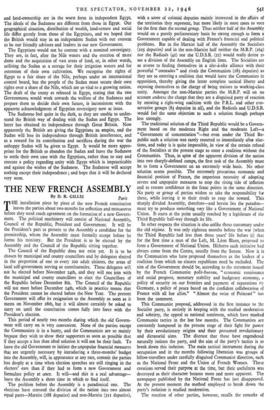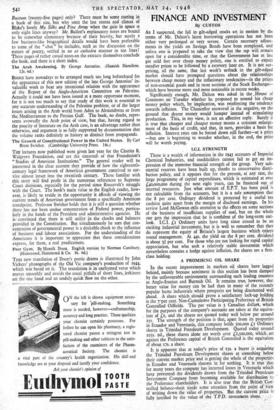THE NEW FRENCH ASSEMBLY
THE installation piece by piece of the new French constitution leaves the parties about two months for reflection and manoeuvre before they need reach agreement on the formation of a new Govern- ment. The political machinery will consist of National Assembly, Council of the Republic, President and Government. It will be the President's part to present to the Assembly a candidate for the premiership, whom the Assembly must formally accept before he forms his ministry. But the President is to be elected by the Assembly and the Council of the Republic sitting together.
The Council of the Republic does not exist yet. It is to be chosen by municipal and county councillors and by delegates elected in the proportion of one to every zoo adult citizens, the areas of local self-government serving as constituencies. These delegates will not be elected before November 24th, and they will not join with the municipal and county councilors to elect the Councillors of the Republic before December 8th. The Council of the Republic will not meet before December 24th, which in practice means that the President cannot be elected before the New Year. The present Government will offer its resignation to the Assembly as soon as it meets on November 28th, but it will almost certainly be asked to carry on until the constitution comes fully into force with the President's election.
This period of nearly two months during Which the old Govern- ment will carry on is very convenient. None of the parties except the Communists is in a hurry, and the Communists are so mainly because they wish to show their supporters as soon as possible that If they accept a less than ideal solution it will not be their fault. To leave the old Government to initiate the unpopular financial measures that are urgently necessary by introducing a three-months' budget into the Assembly, will, in appearance at any rate, commit the parties less deeply at a time when election speeches are still ringing in the electors' ears than if they had to form a new Government and formulate policy at once. It will—and this is a real advantage— leave the Assembly a short time in which to find itself.
The problem before the Assembly is a paradoxical one. The elections have stressed the division of the nation into two almost equal parts—Marxist (288 deputies) and non-Marxist (311 deputies),
with a score of colonial deputies mainly interested in the affairs of the territories they represent, but more likely in most cases to vote for the first than the second group. Thus neither half of the Assembly would on a purely parliamentary basis be strong enough to farm a Government capable of dealing with France's financial and political problems. But in the Marxist half of the Assembly the Socialists (to deputies) and in the non-Marxist half neither the M.R.P. (164) nor the Radicals (42) nor the U.D.S.R. (22) would really desire to see a division of the Assembly on English lines. The Socialists are as averse to finding themselves in a tete-a-tete alliance with their powerful " comrades " and rivals the Communists (183 deputies) as they are to entering a coalition that would leave the Communists in opposition, thereby giving the latter complete tactical liberty and exposing themselves to the charge of being traitors to working-class unity. Amongst the non-Marxist parties the M.R.P. will on no account endorse the charge that they are a disguised party of reaction by entering a right-wing coalition with the P.R.L. and other con- servative groups (83 deputies in all), and the Radicals and U.D.S.R. would feel the same objection to such a solution though perhaps less strongly.
The traditional solution of the Third Republic would be a Govern- ment based on the moderate Right and the moderate Left—a "Government of concentration "—but even under the Third Re- public such a solution was rarely resorted to immediately after elec- tions, and today it is quite impossible, in view of the certain refusal of the Socialists at the present stage to enter a coalition without the Communists. Thus, in spite of the apparent division of the nation into two sharply-defined camps, the first task of the Assembly must be to form a Government on an extremely wide basis. No other solution seems possible. The extremely precarious economic and financial position of France, the imperious necessity of adopting severe and unpopular measures to stop the rising tide of inflation and to restore confidence in the franc points in the same direction. No party or group of parties wishes to take the responsibility for these, while leaving it to their rivals to reap the reward. This sharply divided Assembly, therefore—and herein lies the paradox— must try to produce something very like a Government of National Union. It starts at the point usually reached by a legislature of the Third Republic half-way through its life.
In other respects the situation is also unlike those customary under the old regime. It was only eighteen months before the war (when the Third Republic had less than three years' life before it) that for the first time a man of the Left, M. Leon Blum, proposed to form a Government of National Union. Hitherto such initiative had always come from the Centre, usually from the Senate. Now it is the Communists who have proposed themselves as the leaders of a coalition from which no sincere republican need be excluded. The aim of the Government should be, according to the statement issued by the French Communist polit-bureau, "economic renaissance and social progress, monetary stability and budgetary economy, a policy of security on our frontiers and payment of reparations ry Germany, a policy of peace based on the confident collaboration of France with all her allies." "Almost the voice of Poincare " has been the comment.
This Communist proposal, addressed in the first instance to the Socialist party, is entirely in keeping with the studied moderation and sobriety, the appeal to national sentiment, which have marked Communist tactics in the last few months. The Communists are constantly hampered in the present stage of their fight for power by their revolutionary origins and their presumed revolutionary and dictatorial aims. The distrust that these have engendered naturally isolates the party, and the aim of the party's tactics is to break down this isolation. The main tactical instrument during the occupation and in the months following liberation was groups of fellow-travellers under carefully disguised Communist direction, such as the National Front and the Union of French Women. These creations served their purpose at the time, but their usefulness was destroyed as their character became more and more apparent. The newspaper published by the National Front has just disappeared. At the present moment the method employed to break down the party's isolation is studied moderation.
The reaction of other parties, however, recalls the remarks of Rustum (twenty-five pages) only? There must be some cutting in a book of this size, but why omit the last stanza and climax of Blake's lovely My Silks and Fine Array when the gain in space is only eight lines anyway? Mr. Bullett's explanatory notes are bound to be somewhat elementary because of their brevity, but surely a few business-like biographical details would have been preferable to some of the " chat ' he includes, such as the discussion on the nature of poetry, settled in an ex cathedra manner in ten lines! Three pages of rather casual notes on the extracts themselves conclude the book, and there is a short index.



























 Previous page
Previous page